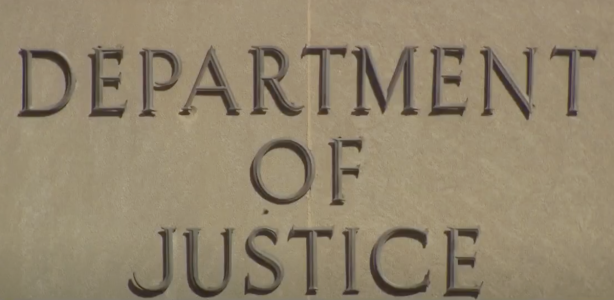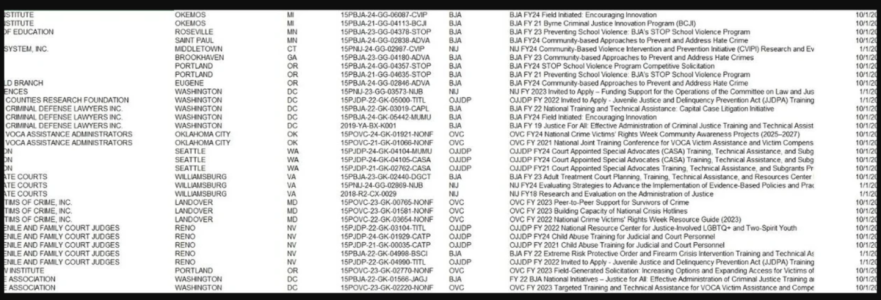Changes to Justice Department grants are creating new challenges for victim support programs
By
Veronica E.
- Replies 0
Programs across the country that support victims of crime and violence are facing an uncertain future following a recent funding freeze by the US Department of Justice.
The decision has affected a wide range of initiatives, prompting nonprofits, advocates, and community leaders to voice concerns about the impact on public safety and support services.
According to CBS News, the Department of Justice paused funding for several grant programs that assist victims of hate crimes, school violence, child abuse, domestic terror incidents, and human trafficking.
The freeze has disrupted services at organizations that provide critical support, including counseling, legal aid, reentry programs for young offenders, and services for crime victims with disabilities.

Some nonprofit organizations received memos from the Justice Department on Tuesday notifying them that certain projects no longer aligned with the department's priorities.
As a result, several federal grants were halted, leading to disruptions at affected nonprofit programs, according to leaders who spoke with CBS News.
Some groups are now facing staff layoffs and reduced services.
One organization, Activating Change, which supports youth crime victims and individuals with disabilities in Oakland, California, reported losing approximately 40% of its budget.
Executive Director Nancy Smith described the situation as a major setback for their ability to provide resources such as sign language interpreters and legal assistance.
The Justice Department later reinstated funding for certain organizations, including the National Center for Victims of Crime and the National Network to End Domestic Violence, after public concern and media attention highlighted the potential effects of the cuts.
Renee Williams, Executive Director of the National Center for Victims of Crime, expressed gratitude for the funding reinstatement but emphasized that many partner organizations are still grappling with the aftermath of the freeze.
Williams noted that their national hotline for crime victims, which receives roughly 16,000 calls annually, plays a critical role in connecting individuals to help and resources.
Organizations that lost grant awards have been given a 30-day window to appeal the decision.
A Justice Department spokesperson stated: "We are confident that these cuts are consistent with the administration's priorities while at the same time protecting services that tangibly impact victims."
However, community leaders continue to express concern about the broader consequences.
The affected programs include a San Francisco organization focused on reducing hate crimes against Asian American and Pacific Islander communities, a New York group working to prevent school shootings, the Emmett Till Cold Case Investigations and Prosecution Program in New Orleans, the Matthew Shepard and James Byrd Hate Crimes Training and Technical Assistance Initiative in Florida, a Michigan organization supporting young offenders reentering society, and a Virginia program assisting victims of human trafficking and sexual exploitation.
Joe Griffin, Executive Director of Youth Alive! in California, pointed out that funding disruptions arriving before summer—when violence rates often rise—could make it more challenging to maintain support programs during a critical period.
The recent suspension of grant funding has prompted conversations about how communities can continue supporting victims of violence in the absence of federal assistance.
Nonprofit organizations, which play an important role in delivering critical services, are exploring alternative funding sources and adjusting their operations to adapt to the changes.
At The GrayVine, we are committed to keeping our readers informed about developments that impact community support efforts.
Staying informed, connecting with local organizations, and being aware of available resources remain important steps during this period of transition.
Read next: Attention seniors! Missing this step could freeze your social security pension

We invite you to share your thoughts. Have you or someone you know been affected by recent funding changes? How can communities work together to support these important services? Join the conversation in the comments below.
The decision has affected a wide range of initiatives, prompting nonprofits, advocates, and community leaders to voice concerns about the impact on public safety and support services.
According to CBS News, the Department of Justice paused funding for several grant programs that assist victims of hate crimes, school violence, child abuse, domestic terror incidents, and human trafficking.
The freeze has disrupted services at organizations that provide critical support, including counseling, legal aid, reentry programs for young offenders, and services for crime victims with disabilities.

Recent funding decisions by the US Department of Justice have affected programs supporting victims of crime and violence across the country. Image Source: YouTube / News 8 Now.
Some nonprofit organizations received memos from the Justice Department on Tuesday notifying them that certain projects no longer aligned with the department's priorities.
As a result, several federal grants were halted, leading to disruptions at affected nonprofit programs, according to leaders who spoke with CBS News.
Some groups are now facing staff layoffs and reduced services.
One organization, Activating Change, which supports youth crime victims and individuals with disabilities in Oakland, California, reported losing approximately 40% of its budget.
Executive Director Nancy Smith described the situation as a major setback for their ability to provide resources such as sign language interpreters and legal assistance.
Some funding restored following concerns
The Justice Department later reinstated funding for certain organizations, including the National Center for Victims of Crime and the National Network to End Domestic Violence, after public concern and media attention highlighted the potential effects of the cuts.
Renee Williams, Executive Director of the National Center for Victims of Crime, expressed gratitude for the funding reinstatement but emphasized that many partner organizations are still grappling with the aftermath of the freeze.
Williams noted that their national hotline for crime victims, which receives roughly 16,000 calls annually, plays a critical role in connecting individuals to help and resources.
Also read: Judge halts Trump’s bold money move–how can this affect you?
Appeal process and department response
Organizations that lost grant awards have been given a 30-day window to appeal the decision.
A Justice Department spokesperson stated: "We are confident that these cuts are consistent with the administration's priorities while at the same time protecting services that tangibly impact victims."
However, community leaders continue to express concern about the broader consequences.
Also read: Global aid shifts raise concerns over health and hunger, officials warn
The affected programs include a San Francisco organization focused on reducing hate crimes against Asian American and Pacific Islander communities, a New York group working to prevent school shootings, the Emmett Till Cold Case Investigations and Prosecution Program in New Orleans, the Matthew Shepard and James Byrd Hate Crimes Training and Technical Assistance Initiative in Florida, a Michigan organization supporting young offenders reentering society, and a Virginia program assisting victims of human trafficking and sexual exploitation.
Joe Griffin, Executive Director of Youth Alive! in California, pointed out that funding disruptions arriving before summer—when violence rates often rise—could make it more challenging to maintain support programs during a critical period.
The recent suspension of grant funding has prompted conversations about how communities can continue supporting victims of violence in the absence of federal assistance.
Nonprofit organizations, which play an important role in delivering critical services, are exploring alternative funding sources and adjusting their operations to adapt to the changes.
At The GrayVine, we are committed to keeping our readers informed about developments that impact community support efforts.
Staying informed, connecting with local organizations, and being aware of available resources remain important steps during this period of transition.
Read next: Attention seniors! Missing this step could freeze your social security pension
Key Takeaways
- The US Department of Justice has paused funding for several programs supporting victims of crime and violence prevention initiatives.
- Nonprofit organizations have reported service disruptions, potential layoffs, and financial uncertainty as a result of the funding freeze.
- Some grants, including funding for national victim hotlines, were reinstated following public and media attention.
- The Department of Justice stated that the changes are aligned with current funding priorities, while community leaders continue to raise concerns about the broader impact.
We invite you to share your thoughts. Have you or someone you know been affected by recent funding changes? How can communities work together to support these important services? Join the conversation in the comments below.







